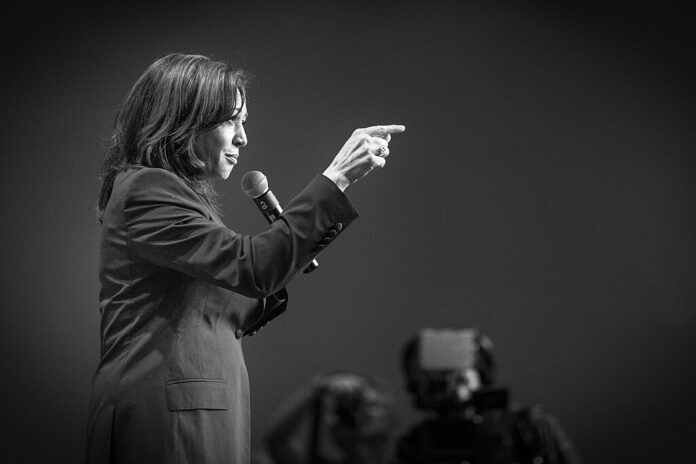In a 25-minute exchange on MSNBC, Vice President Kamala Harris defended her agenda but sidestepped critical inquiries regarding economic perceptions and potential political pitfalls
In a highly anticipated appearance on MSNBC, Vice President Kamala Harris conducted her first one-on-one cable television interview since becoming the Democratic nominee for president. The 25-minute discussion with Stephanie Ruhle aired on September 25, 2024, and focused on Harris’s vision for America while navigating through key challenges facing the Biden administration.
Throughout the interview, Harris maintained her characteristic poise and enthusiasm, championing policies that she claims will benefit the middle class. She reiterated the themes of her pro-business economic speech delivered earlier that day, emphasizing the need for increased support for American families and workers. However, when pressed by Ruhle about how her proposals would resonate with those who feel disconnected from them, Harris responded with broad statements rather than specifics.
Instead of addressing why former President Donald Trump continues to enjoy favourable polling regarding economic management, she pivoted to critique his past policies. She pointed to Trump’s record on job losses in manufacturing and highlighted the potential pitfalls of his tariff proposals, which she claimed would unfairly burden American consumers. Yet, her response lacked a concrete explanation for why many voters still trust Trump over the current administration.
Embed from Getty ImagesAnother key moment arose when Ruhle posed a question about the ramifications for Democrats if they were to lose control of the Senate. Rather than delving into possible strategies or contingencies, Harris focused on the ambitious initiatives she advocates, such as a middle-class tax cut and increased funding for childcare and healthcare.
As Harris reiterated her commitment to creating a fairer economic landscape, she maintained that her policies cater to everyone with aspirations and ambitions. “If you are hardworking and you have dreams, you are in my plan,” she asserted. However, her reluctance to tackle direct questions suggested an attempt to steer the narrative rather than confront pressing issues head-on.
Harris’s interview reflected a careful strategy as she seeks to solidify her base ahead of the upcoming election. With the stakes high and the Democratic Party facing scrutiny from multiple fronts, her ability to connect with voters and clearly articulate her vision remains crucial.
Analysis
Political Perspective:
Harris’s interview illustrates the broader challenges faced by the Democratic Party as they gear up for the 2024 presidential election. By avoiding direct answers to tough questions about voter sentiment toward Trump, Harris risks alienating undecided voters who are increasingly concerned about economic issues. This cautious approach may help maintain party unity but could also hinder the effectiveness of her campaign in addressing critical concerns.
Social Perspective:
The dynamics of the interview reflect the current social climate, where political messaging is often met with scepticism. Harris’s commitment to middle-class welfare resonates with many, yet her inability to confront hard questions may lead to a perception of disconnect from the electorate. Voters today seek authenticity and transparency, and the reluctance to engage with challenging topics might reinforce existing societal doubts about political figures.
Racial Perspective:
As a woman of colour in a leadership role, Harris represents a significant demographic shift within U.S. politics. Her policies are often framed within the context of equity and inclusion. However, her interview showcased a missed opportunity to address how her administration would specifically tackle racial disparities in economic opportunities. By not confronting these issues directly, she risks alienating minority communities who feel overlooked in political discourse.
Gender Perspective:
Harris’s presence as a female vice president brings unique challenges and expectations. The scrutiny she faces is often amplified by gender dynamics, with women leaders frequently held to higher standards of accountability. Her avoidance of direct questions may draw criticism, reinforcing stereotypes that women in leadership are less decisive. To navigate these gender biases effectively, Harris must blend assertiveness with empathy in her public engagements.
Economic Perspective:
The ongoing perception that Trump is more competent on economic issues poses a significant challenge for Harris and the Democratic Party. While she promotes policies aimed at stimulating the economy and supporting families, her reluctance to address why voters feel Trump is a better option could undermine her credibility. As economic conditions fluctuate, demonstrating a clear understanding of the issues affecting everyday Americans will be vital for her campaign’s success.
In conclusion, Kamala Harris’s interview encapsulates the complex landscape she navigates as a candidate. By focusing on broad themes rather than engaging directly with voter concerns, she risks failing to connect meaningfully with the electorate. As the election approaches, her ability to strike a balance between her vision and the realities faced by voters will determine her campaign’s trajectory.
